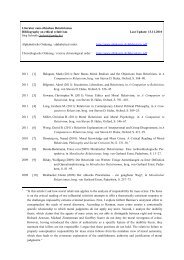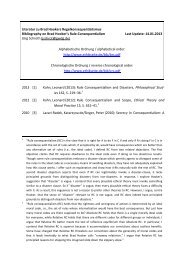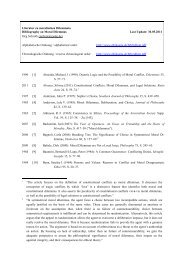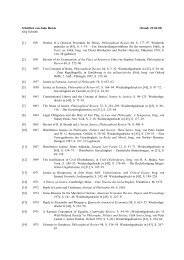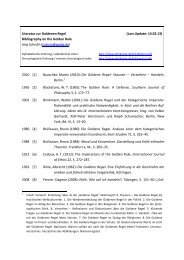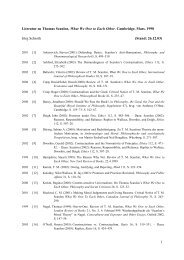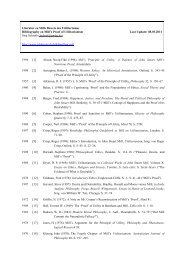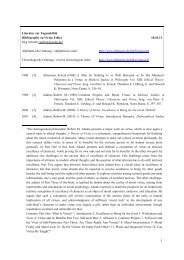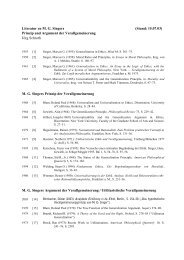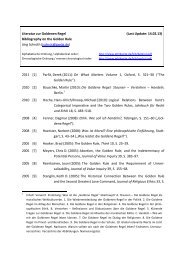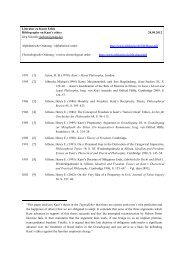Chronologische - Ethikseite
Chronologische - Ethikseite
Chronologische - Ethikseite
Create successful ePaper yourself
Turn your PDF publications into a flip-book with our unique Google optimized e-Paper software.
2010 [108] Rehbock, Theda (2010): Moral und Sprache. Ist das Verbot der Lüge sprachphilosophisch<br />
begründbar?, Deutsche Zeitschrift für Philosophie 58, S. 105–25. 35<br />
2010 [109] Roff, Heather M. (2010): Kantian Provisional Duties, Jahrbuch für Recht und Ethik 18, S. 533-<br />
–62.<br />
2010 [110] Schönecker, Dieter E. (2010): Kant über Menschenliebe als moralische Grundlage, Archiv für<br />
Geschichte der Philosophie 92, S. 133–75. 36<br />
2010 [111] Schwartz, Jeremy (2010): Do Hypothetical Imperatives Require Categorical Imperatives?,<br />
European Journal of Philosophy 18, S. 84–107. 37<br />
34 Preface vii. List of contributors viii. Translations and abbreviations x. Introduction – Andrews Reath 1. The<br />
origin and aim of Kant’s Critique of Practical Reason – Heiner F. Klemme 11. Formal principles and the<br />
form of a law – Andrews Reath 31. Moral consciousness and the ‘fact of reason’ – Pauline Kleingeld 55.<br />
Reversal or retreat? Kant’s deductions of freedom and morality – Jens Timmermann 73. The Triebfeder of<br />
pure practical reason – Stephen Engstrom 90. Two conceptions of compatibilism in the Critical Elucidation<br />
– Pierre Keller 119. The Antinomy of Practical Reason: reason, the unconditioned and the highest good –<br />
Eric Watkins 145. The primacy of practical reason and the idea of a practical postulate – Marcus<br />
Willaschek 168. The meaning of the Critique of Practical Reason for moral beings: the Doctrine of Method<br />
of Pure Practical Reason – Stefano Bacin 197. Bibliography 216. Index 223.<br />
35 “The paper tries to defend the Augustinian and Kantian position on the moral problem of lying against the<br />
popular opinion that this position must be rejected as an inhuman rigorism. The first part argues that<br />
Augustine and Kant do not intend to condemn entirely any kind of lying in any single case, which would be<br />
the task of (the power of) judgment (Urteilskraft). Rather, they strive for a clarification of lying as a<br />
fundamental moral concept of language. Those concepts are not morally neutral, as consequentialist<br />
positions hold, but function rather as a kind of conceptual measure or compass for moral judgment. That<br />
means that single lies can be excusable or an inevitable evil. But under no circumstance do we have a right<br />
or even an obligation to lie. The second part shows how the moral prohibition against lying as a linguistic<br />
act can be argued for - as Augustine and Kant do - by reflection on the anthropological meaning of language<br />
for human existence. For this purpose, following the phenomenological tradition three meanings of<br />
language are distinguished: 1. language as object, 2. language as practice, 3. language as “Sinnhorizont”<br />
(conceptual structured horizon of sense).”<br />
36 “In the Introduction of the Tugendlehre, Kant identifies love of human beings as one of the four moral<br />
predispositions that make us receptive to the moral law. We claim that this love is neither benevolence nor<br />
the aptitude of the inclination to beneficence in general (both are also called love of human beings); rather it<br />
is amor complacentiae, which Kant understands as the delight in moral striving for perfection. We also<br />
provide a detailed analysis of Kant’s almost completely neglected theory of moral predispositions. They are<br />
necessary conditions to be aware of the moral law and to be motivated by it.”<br />
37 “Recently, the idea that every hypothetical imperative must somehow be ‘backed up’ by a prior categorical<br />
imperative has gained a certain influence among Kant interpreters and ethicists influenced by Kant. Since<br />
instrumentalism is the position that holds that hypothetical imperatives can by themselves and without the<br />
aid of categorical imperatives explain all valid forms of practical reasoning, the influential idea amounts to<br />
a rejection of instrumentalism as internally incoherent. This paper argues against this prevailing view both<br />
as an interpretation of Kant and as philosophical understanding of practical reason. In particular, it will be<br />
argued that many of the arguments that claim to show that hypothetical imperatives must be backed up by<br />
categorical imperatives mistakenly assume that the form of practical reasoning must itself occur as a



